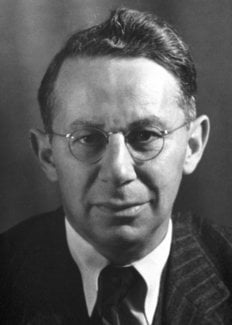Tadeus Reichstein
Biographical

Tadeus Reichstein was born on July 20th, 1897, at Wloclawek, Poland. He was the son of Isidor Reichstein and Gastava Brockmann. After passing his early childhood at Kiev, where his father was an engineer, Reichstein was educated, first at a boarding-school at Jena and later, when his family moved to Zurich (where he was naturalized), he first went to a private tutor and later to the Oberrealschule (technical school of junior college grade) and the Eidgenössische Technische Hochschule (E.T.H.) (State Technical College).
In 1916 Reichstein passed his school-leaving examination and began to study chemistry at the E.T.H. at Zurich, taking his diploma there in 1920. He then spent a year in industry and then began to work for his doctorate under Professor H. Staudinger. In 1922 he graduated and then began research under Professor Staudinger on the composition of the flavouring substances in roasted coffee.
After leaving Professor Staudinger, he continued to work for nine years on this subject, being financed for this purpose by an industrial firm, who provided him with an assistant. The aroma of coffee is, he found, composed of extremely complex substances, among which are derivatives of furan and pyrrole, and substances containing sulphur. Reichstein published during this period a series of papers on these substances and on new methods of demonstrating and making them, and also on the aromatic substances in chicory.
In 1929 he qualified as a lecturer at the E.T.H. Here he lectured on organic and physiological chemistry and in 1931, when his work on aromatic substances in coffee and chicory ended, he became assistant to Professor L. Ruzicka and was then able to devote himself exclusively to scientific research.
In 1934 he was appointed Titular Professor, in 1937 Associate Professor, and in 1938 Professor in Pharmaceutical Chemistry, and Director of the Pharmaceutical Institute in the University of Basel. In 1946 he took over, in addition, the Chair of Organic Chemistry and he held both these appointments until 1950, when a new Director of the Pharmaceutical Institute was appointed.
Between the years 1948-1952 he supervised the building and equipment of a new Institute of Organic Chemistry, which was ready for occupation in 1952, Reichstein becoming its Director in 1960. He now lives in Basel.
In 1933 Reichstein succeeded, independently of Sir Norman Haworth and his collaborators in Birmingham, in synthesizing vitamin C (ascorbic acid). Otherwise he has worked on the glycosides of plants, and during the years 1953-1954 he worked in collaboration with S. A. S. Simpson and J. F. Tait (London), with A. Wettstein and R. Neher (Ciba Ltd., Basel), and M. Tausk (N.V. Organon, Oss, The Netherlands), and isolated and explained the constitution of aldosterone, a hormone of the adrenal cortex, which until then had not been isolated. Reichstein also collaborated with E. C. Kendall and P. S. Hench in their work on the hormones of the adrenal cortex which culminated in the isolation of cortisone and the discovery of its therapeutic value in the treatment of rheumatoid arthritis. For this work, Reichstein, Kendall, and Hench were jointly awarded the Nobel Prize for Physiology or Medicine in 1950.
In 1947 he received the Honorary Doctorate of the Sorbonne, Paris, and in 1952 he was elected a Foreign Member of the Royal Society, London.
Reichstein married Henriette Louise Quarles van Ufford, of Dutch nobility, in 1927. They have one daughter.
This autobiography/biography was written at the time of the award and first published in the book series Les Prix Nobel. It was later edited and republished in Nobel Lectures. To cite this document, always state the source as shown above.
Tadeus Reichstein died on August 1, 1996.
Nobel Prizes and laureates
Six prizes were awarded for achievements that have conferred the greatest benefit to humankind. The 12 laureates' work and discoveries range from proteins' structures and machine learning to fighting for a world free of nuclear weapons.
See them all presented here.
